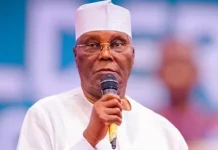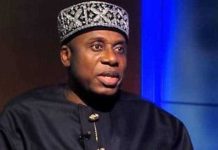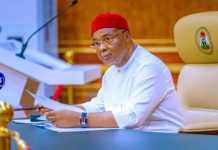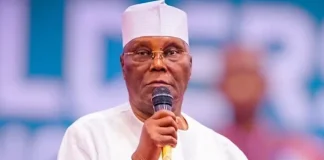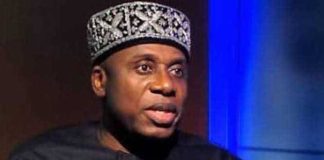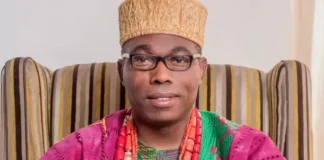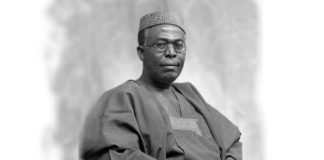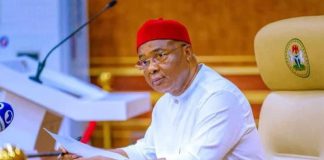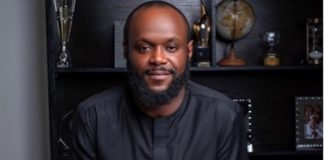🌿 Ruzu Non-Alcoholic Herbal Bitters
Ruzu Non-Alcoholic Herbal Bitters is a natural health supplement specially formulated to:
- ✅ Promote general wellness
- ✅ Detoxify the body
- ✅ Support the treatment of various ailments
Made from a powerful blend of 100% organic and medicinal herbs, Ruzu is completely alcohol-free, making it ideal for:
- 👪 All age groups
- 🌱 Health-conscious individuals
- 🌿 Anyone seeking non-alcoholic herbal remedies
Whether you're looking to boost your vitality, cleanse your system, or support healing the natural way, Ruzu Bitters offers a trusted herbal solution.
Attempts to bring Governor Siminalayi Fubara and Federal Capital Territory Minister Nyesom Wike together have failed two weeks after the National Assembly suggested a peace committee, indicating that the political crisis roiling Rivers State is far from over.
Remember how President Bola Tinubu in March imposed a state of emergency due to the state’s increased tensions, suspending Governor Fubara, Deputy Governor Ngozi Odu, and all state lawmakers for six months. As Sole Administrator, Vice-Admiral Ibok Ibas (rtd) was appointed right away.
The President’s request was promptly granted by the National Assembly, but both houses recommended that a committee be established to mediate between the opposing sides before the suspension period ended. On the other hand, no meaningful steps have been taken to start the peace process.
Some prominent Ijaw and Rivers leaders’ actions during the crisis are reportedly impeding reconciliation, according to sources in the state capital, Port Harcourt.
“Those who ought to have guided us out of the woods this time chose a side in the conflict. They are not credible enough to invite the two sides to a roundtable, according to an insider.
According to the source, the division widened even more when numerous Ijaw leaders publicly backed Governor Fubara while ignoring Wike. Additionally, he chastised former President Goodluck Jonathan and other organizations for allegedly renunciating their neutral positions.
“Goodluck Jonathan, the former president who ought to have been in charge of the peace negotiations at this time, was pressured to support Governor Fubara in the crisis,” he claimed. Because of its blatant partiality in the issue, the Ijaw National Congress (INC), headed by Prof. Benjamin Okaba, let the Ijaw down. Professor Okaba did not make things any better.
The seniors in Rivers are already separated into Wike’s and Fubara’s groups, he continued. These are the folks who ought to have stepped forward by now, but they no longer have the respect necessary to promote true reconciliation. Right now, it appears that nothing is being done to initiate any kind of reconciliation.
Ijaw Youths Council (IYC) Worldwide President Jonathan Lokpobiri also voiced dissatisfaction with how some Ijaw leaders handled the crisis.
“With all due responsibility and conviction, I can say that we would not be in this situation now if we had handled this crisis in Rivers wisely,” Lokpobiri stated. “Rather than applying wisdom to issues we can prevent, we decided to threaten war for which we were unprepared.”
“People talk sloppily to try to drag an ethnic group into an avoidable war,” he added. When the battle arrived, I could no longer hear the words of those who promised to use fire and brimstone. We must use caution when pursuing the Niger Delta’s struggles.
Read Also: Uriel of BBNaija Pledges to Adopt Baby Found Abandoned in Kogi
Lokpobiri emphasized that there is no room for emotional responses in important political debates while restating support for Fubara to serve out his term. He remarked that “sometimes wisdom is stronger than the arms we think we have gathered.” “This embarrassing situation of a state of emergency would not have arisen if we had resolved this issue internally as we previously recommended.”
Kennedy Tonjo-West, the president of the Movement for Izon Ethnic Nationality Development (MOSIEND), stated that his organization is prepared to assist in starting peace initiatives after remaining neutral during the conflict.
“I’m already doing some consultations to ensure that the reconciliation process gets underway on schedule. He stated, “We want Rivers to get back to a reconciliation process as soon as possible.”
Since the general elections in 2023, Wike and Fubara have been at odds, even though Wike previously backed the governor.
Governor Fubara has since gone back to his own home in Port Harcourt, while the majority of the suspended lawmakers—many of whom are Wike supporters—are apparently on vacation overseas.


